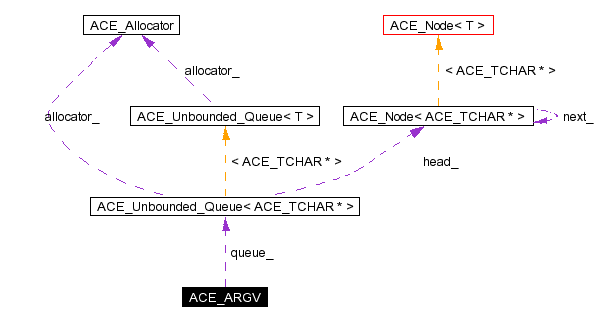
#include <ARGV.h>
Collaboration diagram for ACE_ARGV:

Public Types | |
| enum | States { TO_STRING = 1, TO_PTR_ARRAY = 2, ITERATIVE = 3 } |
Public Methods | |
| ACE_ARGV (const ACE_TCHAR buf[], int substitute_env_args=1) | |
| ACE_ARGV (ACE_TCHAR *argv[], int substitute_env_args=1) | |
| ACE_ARGV (ACE_TCHAR *first_argv[], ACE_TCHAR *second_argv[], int substitute_env_args=1) | |
| ACE_ARGV (int substitute_env_args=1) | |
| ~ACE_ARGV (void) | |
| Destructor. | |
| const ACE_TCHAR * | operator[] (size_t index) |
| Returns the <index>th string in the ARGV array. | |
| ACE_TCHAR ** | argv (void) |
| int | argc (void) const |
| Returns <argc>. | |
| const ACE_TCHAR * | buf (void) |
| void | dump (void) const |
| Dump the state of an object. | |
| int | add (const ACE_TCHAR *next_arg) |
| int | add (ACE_TCHAR *argv[]) |
| int | state (void) const |
| What state is this ACE_ARGV in? | |
Public Attributes | |
| ACE_ALLOC_HOOK_DECLARE | |
| Declare the dynamic allocation hooks. | |
Private Methods | |
| ACE_ARGV (const ACE_ARGV &) | |
| Copy Constructor not implemented. | |
| ACE_ARGV | operator= (const ACE_ARGV &) |
| Assignment '=' operator not implemented. | |
| int | create_buf_from_queue (void) |
| Creates buf_ from the queue, deletes previous buf_. | |
| int | string_to_argv (void) |
| Converts buf_ into the ACE_TCHAR *argv[] format. | |
| int | argv_to_string (ACE_TCHAR **argv, ACE_TCHAR *&buf) |
Private Attributes | |
| int | substitute_env_args_ |
| Replace args with environment variable values? | |
| int | state_ |
| Current state marker. | |
| int | argc_ |
| Number of arguments in the ARGV array. | |
| ACE_TCHAR ** | argv_ |
| The array of string arguments. | |
| ACE_TCHAR * | buf_ |
| Buffer containing the <argv> contents. | |
| size_t | length_ |
| ACE_Unbounded_Queue< ACE_TCHAR * > | queue_ |
|
|
|
|
||||||||||||
|
Splits the specified string into an argument vector, split at whitespace.
|
|
||||||||||||
|
Converts <argv> into a linear string. If <substitute_env_args> is enabled then we'll substitute the environment variables for each $ENV encountered in the string. The <buf> operation is not allowed on an ACE_ARGV created this way. |
|
||||||||||||||||
|
Creates an ACE_ARGV which is the concatenation of the first_argv and the second argv. The argv arguments should be null pointer terminated. |
|
|
Entry point for creating an ACE_TCHAR *[] command line iteratively via the <add> method. When this constructor is used, the <ITERATIVE> state is enabled. The <argv> and <buf> methods are allowed, and the result is recreated when called multiple times. The subscript operator is not allowed. |
|
|
Destructor.
|
|
|
Copy Constructor not implemented.
|
|
|
Add another <argv> array. The <argv> parameter must be NULL terminated. This only works in the <ITERATIVE> state. Returns -1 on failure and 0 on success. |
|
|
Add another argument. This only works in the <ITERATIVE> state. Note that this method does not copy <next_arg>, nor does it assume ownership of managing its memory, i.e., the caller is responsible for memory management. Returns -1 on failure and 0 on success. |
|
|
Returns <argc>.
|
|
|
Returns the <argv> array. Caller should not delete this memory since the <ARGV> destructor will delete it. If the caller modifies the array in the iterative mode, the changes are not saved to the queue. |
|
||||||||||||
|
Returns the string created from argv in buf and returns the number of arguments. |
|
|
Returns the <buf>. Caller should not delete this memory since the <ARGV> destructor will delete it. |
|
|
Creates buf_ from the queue, deletes previous buf_.
|
|
|
Dump the state of an object.
|
|
|
Assignment '=' operator not implemented.
|
|
|
Returns the <index>th string in the ARGV array.
|
|
|
What state is this ACE_ARGV in?
|
|
|
Converts buf_ into the ACE_TCHAR *argv[] format.
|
|
|
Declare the dynamic allocation hooks.
|
|
|
Number of arguments in the ARGV array.
|
|
|
The array of string arguments.
|
|
|
Buffer containing the <argv> contents.
|
|
|
Total length of the arguments in the queue, not counting separating spaces |
|
|
Queue which keeps user supplied arguments. This is only active in the "iterative" mode. |
|
|
Current state marker.
|
|
|
Replace args with environment variable values?
|
 1.2.18
1.2.18